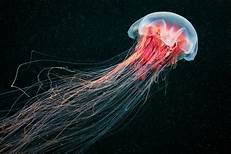
The boys were picnicking with their family at the beach before the incident happened at 11am. The two were immediately rushed to Labuan Hospital for treatment and reported to be in stable condition.
Labuan Fisheries Department director, Faizal Ibrahim Suhaili said a team from the Division of Resource Protection had been sent to the beach for monitoring and sampling purposes.
“We have received a report on the teenagers being stung by jellyfish…and our team is now at the beach to ascertain the species of the plankton.
“We hope the jellyfish that attacked the boys are not the Portuguese man o’ war (superficially resembling a jellyfish), which is infamous for its painful sting. So, our advice to beachgoers is to take extra precaution so as not to risk their lives when spotting the jellyfish in the waters,” he told Bernama when contacted.
Assoc Prof Dr B. A. Venmathi Maran of Borneo Marine Research Institute, Universiti Malaysia Sabah (UMS) said it could be the box jellyfish.
“In the Sabah waters, we found only one species, Chironex yamaguchii, which has so far been found in all the coastal waters of Sabah, but this is the first information on box jellyfish from Labuan as far as I know,” he said when contacted.
He warned that usually, the dry and hot weather allowed this species to increase in number from now until June.
In 2019, at least six people were stung by jellyfish in Sabah, killing one of them, a seven-year-old child from Kota Belud, while in Sapi Island, one fatality was reported in 2006.
The UMS scientist said swimmers and beachgoers should be careful of the deadly jellyfish as it is dangerous and could kill those stung by it if no immediate medical attention is given.
“Box jellyfish are transparent and it is difficult to spot them in the waters. Their sting can cause cardiac and respiratory arrests, aside from excruciating pain. As such, there is a high chance that swimmers would be unaware of their presence until they are stung,” he cautioned.
He said due to this case, it could be anticipated the population of jellyfish to be higher, affecting Sabah and Labuan waters due to the weather in the coming months.
“If you get stung, flush the stung spot with vinegar for 30 to 45 seconds to deactivate the undischarged nematocysts on the tentacles, no rubbing.
“Immediately seek medical treatment. It’s better to avoid areas where jellyfish are known to be present. I request that the authorities put up warning signs on the beaches.
“It’s also better to wear protective clothing for the whole body and bring along a bottle of vinegar with you when you go to the beach,” he advised. – Bernama
The post Two teenagers hospitalised after jellyfish attack appeared first on Borneo Post Online.

